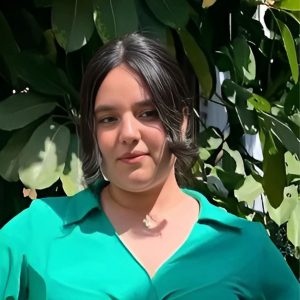
A Visiting Scholar’s Journey at the 2025 ACTC Student Conference
Visiting student scholar Daniela Gallardo Medina of Universidad Panamericana traveled from Mexico to join this year’s Student Conference of the Association for Core Texts and Courses, which DRBU hosted for the first time in early March. Ms. Gallardo Medina shared with us how diverse dialogue and philosophical exchange at DRBU transformed her academic outlook.
How did engaging with students from different universities and cultural backgrounds (like Universidad Panamericana, Biola, Saint Mary’s, and DRBU) influence your understanding of the core texts you discussed?
Listening to and living with students from different universities and cultural environments allowed me to broaden my perspective and notice how such fundamental texts not only remain important references today, but also how they can be adapted and interpreted in very different ways depending on intellectual tradition and lived experiences.
This diversity of interpretations helped me to recognize the importance of having an academic formation around the critical and philosophical thinking that these texts help us to reach in order to extrapolate them to different areas of our lives. It also allowed me to appreciate how fortunate I am to be in a university that offers me such opportunities to get closer and exchange my ideas not only with my own classmates, but also with people from other parts of the world, as I was able to in this particular case.
I found the adaptability of the texts to be impressive, and it forced me to reconsider my interpretations in order to ask deeper questions about them. Ultimately, this experience reinforced the importance of dialogue in academic research, demonstrating that true understanding comes from engaging with multiple perspectives rather than remaining within a single interpretive framework.
After your discussions about ethics and society, what practices or approaches do you think might help heal our divided communities today?
After discussing ethics and society, I believe that one of the most effective ways to help heal our divided communities is by fostering open and empathetic dialogue. Too often we approach conversations with the goal of winning an argument instead of understanding each other. Practicing active listening, where people feel genuinely heard, can bridge a lot of the misunderstandings that divide us.
In addition, promoting education that emphasizes critical thinking, ethical reasoning, and cultural awareness can equip people with the tools to better navigate complex social issues. When individuals are taught to see things from multiple perspectives, they are less likely to fall into polarized thinking.
How has participating in this conference at DRBU influenced how you’ll approach your studies when you return to your home university?
This conference has profoundly influenced how I will approach my studies by reinforcing the value of interdisciplinary learning and deep contemplation.
The opportunity to engage with students and scholars from different traditions has shown me that academic research is most enriching when it is not limited to a single perspective. At DRBU I witnessed how philosophical and ethical debates can be integrated with meditative and introspective practices, emphasizing not only knowledge acquisition but also personal transformation.
Going forward, I intend to incorporate a more reflective approach to my studies, questioning not only what I learn but also how it shapes my ethical and intellectual development. In addition, I have a greater appreciation for the importance of dialogue in education; true understanding often emerges from the intersection of diverse points of view and lived experiences.